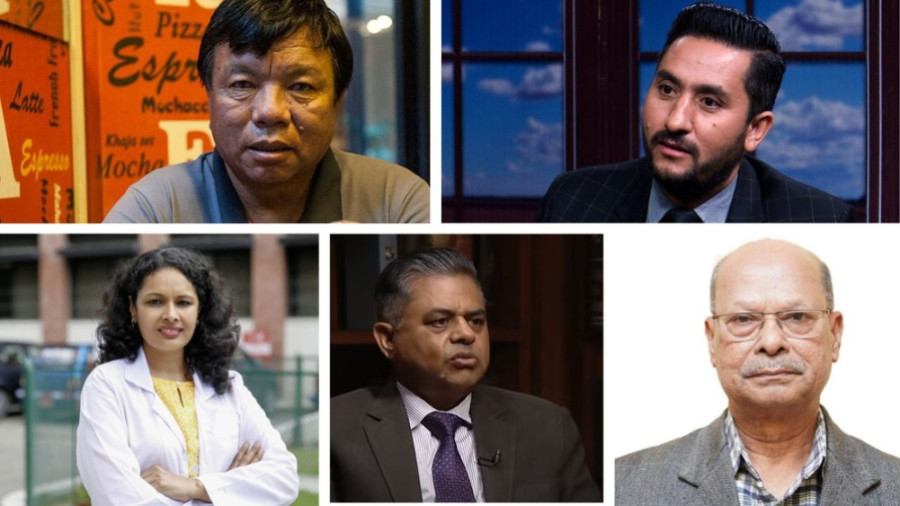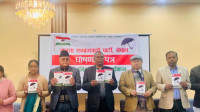National
Sushila Karki names five new ministers, taking total to 9
Cabinet forms high-level panel to probe killings, atrocities, arson and vandalism committed during Gen Z uprising.
Post Report
Prime Minister Sushila Karki on Sunday recommended the names of five new ministers. The interim cabinet already has four ministers, including herself.
According to sources at the Prime Minister’s Office, Anil Kumar Sinha will be given three portfolios—Ministry of Industry, Commerce and Supply; Law and Justice; and Land Reforms, Cooperatives and Poverty Alleviation. Mahabir Pun will be appointed the minister for education and science and technology and Madan Prasad Pariyar agriculture minister while Jagdish Kharel will be assigned the information and communications portfolio.
President Ramchandra Paudel will appoint Sangeeta Mishra the health minister. Mishra was until recently an additional secretary at the health ministry.
Sinha is a former Supreme Court justice. Kharel is the head of news at Image Media Group. Senior climate and agriculture expert Pariyar serves as the president of Samata Foundation, a non-profit that works for social justice and inclusiveness. He previously coordinated the high-level state restructuring commission of the Constituent Assembly.
Pun, the winner of the Roman Magsaysay Award, has long been active in the development of science and research in Nepal. He currently leads the National Innovation Centre.
The three serving ministers in the Karki cabinet are: Rameshore Khanal (minister for finance), Kulman Ghising (minister for energy, water resources and irrigation) and Om Prakash Aryal (minister for home affairs).
Separately, two weeks after the Gen Z uprising, the interim government on Sunday constituted a high-level commission to probe the incidents of killing, arson and vandalism. The protests had turned violent, and caused a huge loss of lives and property.
The judicial inquiry commission led by Gauri Bahadur Karki, former chair of the Special Court, will investigate police atrocities against youths and incidents of arson and vandalism of private and public properties on September 8 and 9.
The panel has Bigyan Raj Sharma, former additional inspector general of Nepal Police, and legal expert Bisheshwor Prasad Bhandari as members. The commission has got three months to complete the investigation and submit its report to the government.
“The last Cabinet meeting had agreed to form the commission,” said Om Prakash Aryal, the home minister. “Today's [Sunday] meeting finalised it.”
While assuming office on September 14, Prime Minister Karki had vowed to probe the killings of youths while also promising action against those involved in vandalising and setting fire to public and private properties.
Nineteen youths were killed on the first day of Gen Z uprising on September 8 when the police indiscriminately fired at the protesters. The death toll from the agitation has reached 74 while hundreds have been injured.
Around 130 of the injured are still receiving treatment in various hospitals. The Gen Z-led protest led to the destruction of vital state offices under the executive, legislature and judiciary.
Hundreds of government buildings across the country were set on fire, not just causing destruction worth hundreds of billions of rupees but also reducing crucial documents and resources to ashes. The mob also set several private houses, business complexes and even banks on fire after looting.
The Gauri Bahadur Karki-led panel will investigate all the violent acts related to the protest.
Moreover, the Cabinet decided to transfer Hitendra Dev Shakya, executive director at the Nepal Electricity Authority, to the Water and Irrigation Commission Secretariat, according to Minister Aryal. Shakya is replaced by Manoj Silwal, former deputy executive director of the power utility.
The Cabinet has also decided to depute AIG Manoj KC as chief of the Central Investigation Bureau, said Aryal. KC had earlier investigated the Bhutanese refugee scam.
Meanwhile, the government has decided to establish a Reconstruction Fund, which can receive contributions from both domestic and foreign sources. Banks, financial institutions, and industrial enterprises will be allowed to contribute their Corporate Social Responsibility funds to this fund, with tax deductions available on such contributions.
A Physical Infrastructure Reconstruction Committee will be formed to manage the fund and oversee its use, according to finance minister Rameshore Khanal.
He also said that the Cabinet decided to write off the vehicles destroyed in the protest from official accounts and sell them as scrap. At the central level, a committee coordinated by the Ministry of Urban Development will carry out this task, while at the district level, committees will be headed by chief district officers.
Additionally, the government has decided to form a committee to assess the damage caused during the protests.
The Cabinet has also decided to halt small-scale projects with a budget less than Rs30 million. Similarly, it decided to put on hold projects exceeding Rs30 million that have not been listed in the project bank, or those later added to the bank under political pressure, or those not properly entered in the system.
“Around Rs120 billion can be saved through these measures,” Khanal said. “The money can be used to clear payments for already completed work where contractors are awaiting payment.”
The saved money will also be redirected to fast-track national pride and major infrastructure projects, Khanal added.




 17.12°C Kathmandu
17.12°C Kathmandu














